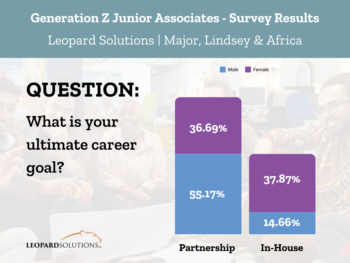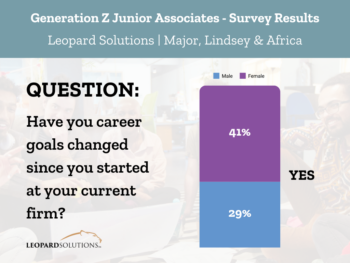Gen Z Lawyers’ Paths Diverge by Gender, Post-Law School
Much has been made about how the Generation Z (Gen-Z) cohort eschews traditional Big Law working models in favor of more flexibility and a reduced in-office commitment. They are more willing to challenge the established ways law firms conduct business, perhaps encouraged by digital nativity that gives agency to the individual, liberating them from the hierarchical structures of the past.
A recent survey conducted by Leopard Solutions in conjunction with Major Lindsey & Africa reveals some truth in that narrative. Still, what it misses is Gen-Z, recipients of JDs between 2021-2023, for purposes of the survey, were not a monolith, and a hivemind narrative is not a one-size-fits-all. Results revealed some notable gender disparities in their perceptions of law firm culture, long-term career aspirations, and the adequacy of their education in preparing them for the practice of law.
Difference in Opinion by Gender
Firm tenure was an area where male and female lawyers viewed themselves on differing trajectories. Male associates were more likely to envision remaining at their firms for three years or more than their female counterparts by 15 percentage points, 77% compared to 61.46%. This notion defied the conventional (if outmoded) thinking that male attorneys are a greater flight risk because they are inherently more ambitious and have more opportunities provided by a predominantly male partnership.
Furthermore, women junior associates were 16 percent more likely to prefer an exit from Big Law after a brief two-year stay. This ran counterintuitive to the women who are more complacent in their jobs-trope. The two-year stint is also significantly shorter than the mid-career drop-off point, which had been more commonplace for women lawyers of preceding generations. The reason for these shifts can be found in the response to the following question: “What is your ultimate career goal?”

Male participants were more likely than females to want to follow the traditional path to the partnership model, 55.17% versus 36.69% (an 18-percentage point difference). On the other hand, female participants were 23 percentage points more likely to want to pivot in-house (37.87% compared to 14.66%).
The male lawyers seem more inclined to endure the arduous, sometimes 10-12-year path to partnership, imbued with the confidence of favorable demographics, and they will emerge on the other end more prosperous and stable. Conversely, many Gen Z women see themselves forgoing this route. Is it because they see alternative routes, like making GC at an F500 company, as ‘cushier’ and more conducive to starting a family, or are they deterred by what unfavorable demographics they still see in front of them at law firms despite any DEI progress?
The answer may be found in this stat: forty-one percent of female respondents stated their goals changed on the road from law school to law firm compared to only 29% of males.
Have your career goals changed since you started at your current firm?

They are entering the workforce with one set of ideals and switching gears once they see reality on the ground. Open-ended responses would lead one to surmise disenchantment persists with the gender imbalance among the partner ranks and a desire for more targeted mentorship initiatives.
When asked, “What change(s) could your firm make that would be the most meaningful to you?” responses reflected this. Some wanted the firm to place more stock in “flexible work arrangements and commitment to the retention of diverse and female attorneys (our associate pool is diverse, but the firm lacks the retention to match this).” Another associate hoped to see “more diversity in leadership, particularly as it expands, as there are opportunities to bring in female partners and POC partners.”
To achieve these outcomes, firms must abolish performative DEI and make “meaningful efforts to reduce sexism and racism at work and be more tolerant of junior associates’ learning progression.”
Register for our webinar on May 7th, during which we will explore the survey responses in greater detail. Register Here.
Posted on



